A recent panel at a women’s construction conference in Vancouver drew from a diverse set of experiences with adverse and sexist workplaces, and suggested ways to overcome these hurdles.
Several construction and management experts gathered at the Vancouver Regional Construction Association (VRCA) and Canadian Construction Women’s inaugural LEAP Women in Construction conference held March 8 in Vancouver.
At a panel titled Sisterhood at Work, Thriveworks Coaching & HR Consulting founder Polina Kouzmina, Crown Building Supplies CFO Jas Sangha, The Thoughtful Co. co-founder Sophie Warwick, Team Canada rugby player Pamphinette Buisa and Shauna Moran of Shauna Moran Coaching all shared their experiences navigating challenging environments.
Warwick pointed to a lack of female leadership representation in business as “feeling like musical chairs.”
“You have to sit in the pink chair, and it’s the only chair,” she said. “It’s really about the system improving. There needs to be more pink chairs or chairs without any colour.
“We need more spots (in order to) elevate each other together.”
Sangha said entering into the construction business from an accounting background and as a woman was at first intimidating, though she grew to cherish the experience.
“Being the only woman in my management team is what scared me the most,” she said. “I was a stay-at-home mom at the time…raising three kids and a kind of lost myself, thought maybe I should just be a mother and forgot I was a CPA until I dived deep into the construction field. It just brought so much growth to my past experiences.”
She added cultural attitudes and sexism both internally and from customers held her back but she has since pushed forward to become a vital part of the business.
“It makes you feel very little. It takes a while for you to be ‘enough is enough,’ but I’m everywhere now and I handle every department,” Sangha said.
Moran said projecting toughness instead of vulnerability can actually be a form of weakness in a manager.
“Share your vulnerabilities. If you have to take an afternoon off for your kids, share that,” she said.
“If you can’t take the time off, that signals that it’s unsafe for your employees to take time off.”
Buisa pointed to high-level rugby as an extremely competitive space that nonetheless gave teammates room for emotional vulnerability.
“I’ve noticed creating safe spaces is about creating brave spaces,” Buisa said.
“Every day is a day to prove yourself. You’re on guard, but it’s about checking in afterwards. When the game’s done, you’re shaking hands and checking in. It’s making sure that you’re not only doing your job but empowering others around you.”
Warwick also pointed to a misconception that men are more confident than women and said it comes down to the importance of relationships.
“Self-confidence is the same across men or women, but women prioritize relationships more, so they minimize their contributions to preserve relationships,” she said.
Kouzmina added conflict avoidance can hold women back.
“For most of us, fear of conflict keeps us from saying something uncomfortable. I don’t like to use the term ‘micro-aggression’ because it seems confrontational, so instead I say, ‘When you said this, what did you mean by it?’”
Moran also cited women’s tolerance for adversity as high compared to that of men.
“We as women can endure a lot of pain, and we can keep going…until we can’t,” she said.











Recent Comments
comments for this post are closed